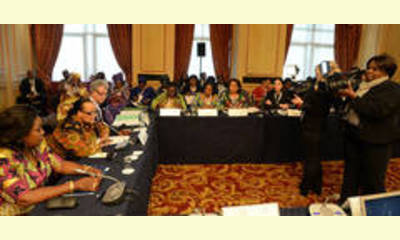|
|
Towards the creation of a network of women for a culture of peace in Africa
un article par UNESCO news
"Building an integrated, prosperous and peaceful Africa, driven by its own citizens and representing a dynamic force in the global arena." This vision, expressed by the African Union, is at the heart of the Operational Strategy of the UNESCO for the Priority Africa. UNESCO has recently reiterated this message on the occasion of the first Crans Montana Forum for African Women, which was held in Brussels from 19 to 22 March 2014, whose honorary committee was co-chaired by Ms. Irina Bokova, Director General of UNESCO, and the Director General of the ISESCO.

Copyright Crans Montana Forum 2014
click on photo to enlarge
The Forum benefited from the participation of HE Ms Njie Saidy Ajaratou Isatou, Vice-President of Gambia, HE Ms Antoinette Sassou-Nguesso, First Lady of the Republic of Congo, HE Ms Judith O. Amaechi, First Lady of "River State" of the Federal Republic of Nigeria, Mr Abdelaziz O. Altwaijri, Director General of ISESCO, several ministers and women members of the Governments of ten African countries, parliamentarians, business leaders, representatives of several United Nations agencies, the World Bank, the media professionals and representatives of various civil society organizations from Africa and the Diaspora.
The closing session of the Forum, chaired by Ms Lalla Aïcha Ben Barka, Deputy Director-General of UNESCO for Africa, was the occasion to present the objectives and actions of a new network dedicated to "Women for a culture of peace in Africa". The ambition is to bring together African and non-African organizations involved in promoting the central role of African women in the prevention and resolution of conflicts. The network will in particular:
· harness the complementarity and competences of each member through the creation of a Community of practices that will provide them with resources for the sharing of good practices and the development of self-learning through ICT,
· develop joint activities in the area of gender equality, women leadership, mediation, conflict prevention and resolution, the fight against violence on women, and women empowerment through education, sciences, culture and communication,
· establish an advisory team that would provide expertise and tutoring in the field of gender empowerment and culture of peace.
Organized in partnership with organizations with expertise in the field of culture of peace and gender equality in Africa, the session showcased their experience on three main themes: the role of women in education and intergenerational relationships, their empowerment through entrepreneurship training, and promoting women's leadership, particularly in the media as well as in anticipating and resolving conflicts.
These "Champion organizations" - the Forum for African Women Educationalists (FAWE), the Foundation for the Development of the Community (FDC), the NGO Women, Africa, Solidarity (Femmes, Africa, Solidarité, FAS), the Foundation Women for Africa, the Association for Development of employment, training and integration (Association pour le développement de l’emploi, de la formation et de l’insertion, ADEFI), the Congo Assistance Foundation (Fondation Congo Assistance) - also presented their vision of this network and stressed the need to launch exemplary actions, primarily in countries affected by conflict as soon as possible.
(This article is continued in the discussionboard)
Click here for the French original of this article.
|








|
DISCUSSION
Il n'y pas encore de question liée à cet article.
* * * * *
Commentaire le plus récent:
(The following is continued from the main article listed above.)
The proposals made include:
· enhancement of the African tradition of Ubuntu transmitted within the family;
· the use of theater in education as a means of expression and dialogue;
· the collection of reliable statistics and the establishment of a set of indicators to measure the role of women in conflicts prevention and resolution;
· the need to establish early warning systems and monitoring and analysis cells (situation room);
- the implementation of a communication strategy to give increased visibility to the actions and the exchange of experience between organizations;
· support for women entrepreneurs, their integration into value chains and access to different forms credit;
· the presentation of another image of African women in the media through training of journalists and the establishment of an observatory "Women and Media";
· the use of international and national volunteering to boost and develop the network.
The first Lady of the Republic of Congo, and the one of the "River State" of the Federal Republic of Nigeria supported this initiative particularly on its focus to address priority concerns. The first of these actions will concern support for women in the Central African Republic and Central African refugees in the Republic of Congo by leveraging the complementary expertise of FAS, FDC, ADEFI and the EU-Africa Chamber of Commerce. After this pilot phase, the official launch of the Network is expected in Africa in 2015.
During this session, around one hundred African, non-African and Diaspora organizations expressed interest in joining this network. If you are willing to join, please contact us at the following address: africa4peace@unesco.org.

|
|









